How Google Works
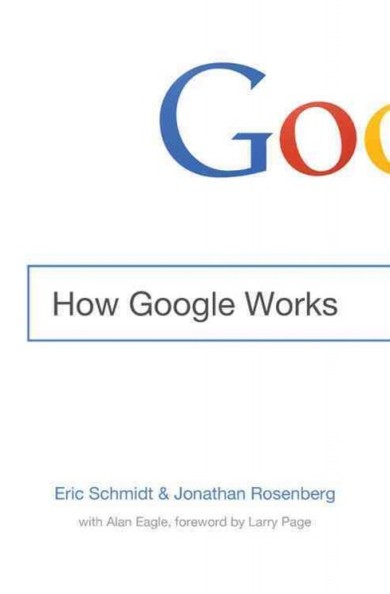
If you want to get an insight into what makes Google so special and successful, this is the book to read.
How Google Works was written by Eric Schmidt (former CEO and now executive chairman of Google) and Jonathan Rosenberg (former SVP of Products at Google) and basically explains what the title of the book already suggests. They talk about several aspects that make a company successful in the internet age like its culture, strategy and how to manage innovation, just to name a few. Schmidt and Rosenberg especially highlight the fact that successful companies need to attract the right kind of employees - the smart creatives - and create an environment they can thrive in.
Some of the content is already common knowledge but How Google Works provides both a broader view and further details on what you might have already heard. The aspects covered are explained in a fun way, peppered with a lot of anecdotes, so reading it is a breeze and doesn't get as boring as a lot of other business management books do. It really is interesting to read about the experience of the authors on how the rules of business have changed from traditional companies to the fast moving internet companies of today.
If I'd have to name one thing I learned from the book, it's that learning is never over. Even if you have seen a lot, like the two authors who have previously worked for companies like Novell and Sun, the (business) world is constantly changing and you have to adjust and always reconsider what you know to stay ahead of things.
OS X Yosemite - More elegant from A to Z?
For some, the choice of a font may not be a big deal. But to us, it’s an integral part of the interface. In OS X Yosemite, fonts have been refined systemwide to be more legible and consistent across the Mac experience. You’ll notice a fresh, new typeface in app windows, menu bars, and throughout the system. The type looks great on any Mac, and even more stunning on a Mac with a Retina display.
Yes, the right font is a big deal for me as well but no, the new type does not look great at all on my non retina displays, quite the contrary.
This "refinement" is really hard for me to understand, coming from a company with such a font expertise. Please fix this, Apple, as I won't be buying a new MacBook just to enjoy Helvetica Neue.
DM 1410 - End of Game Statement
Eine richtig schöne Diplomacy Partie war die DM 1410 und das nicht nur, weil ich die Partie durch einen Kapitulationsvertrag für mich entscheiden konnte.
Am Anfang hatte ich praktisch keine Idee, wohin die Reise genau gehen soll, da mir von allen Seiten freundliche Signale übermittelt wurden. Es schien so, als würde es darüber hinaus genügend Konflikte zwischen allen anderen Nationen geben, also dachte ich mir: Lehne ich mich mal zurück, falte die Hände zur Raute der Macht (lasse mich dabei von vielen Beispielen inspirieren) und lasse die Partie auf mich zukommen.
Nach dem ersten Jahr 1901 war ich ein bisschen genervt von Deutschland, da mir Swe versprochen aber trotzdem verweigert wurde und hatte im Süden eine gute Position, um mich frei zwischen Österreich-Ungarn und der Türkei zu entscheiden. Im Norden war dann schnell klar, dass ich mich mit England verbünde. Die Kommunikation dahin war einfach am Besten und ich musste mir kaum Sorgen machen, da England sich früh mit Frankreich überworfen hat. Im Süden war die Entscheidung wesentlich schwieriger: Eigentlich wollte ich lieber mit der Türkei zusammen spielen aber Österreich-Ungarn hat diplomatisch einfach einen zu guten Job gemacht. Mit Österreich-Ungarn konnte man langfristig planen und die Ziele waren klarer, sodass kurz vor dem Frühjahr 1902 ZAT die schwere Entscheidung fiel gegen die Türkei zu ziehen. Immerhin hatte ich ja auch noch eine Armee in Gal, sodass der Schaden sich in Grenzen gehalten hätte.
1902 hat sich schon gezeigt, dass meine Entscheidungen zumindest kurzfristig die richtigen waren. England beschäftigte sich mit Frankreich und zusammen haben wir Druck auf Deutschland gemacht. Im Süden ging der Feldzug gegen die Türkei optimal voran während Italien und Österreich-Ungarn sich in die Haare bekommen haben. Für mich noch nirgendwo Gefahr, nur viele, viele Mails an das ganze Brett, um die bestehenden Konflikte zu schüren und sich selbst aus der Schußlinie zu halten.
Im Frühjahr 1903 ging es im Norden darum mich so zu positionieren, dass ich mittelfristig mit Frankreich gegen England ziehen kann und Deutschland gleichzeitig in einen Konflikt mit Frankreich bringe. Im Süden ging es nur darum weiter Vertrauen mit Österreich-Ungarn aufzubauen - da ich mittlerweile überzeugt war dieses Bündnis lange durchziehen zu können - und die Türkei rauszunehmen. Zum Glück habe ich noch einiges an der Deutschen Grenze aufgefahren, da Deutschland sich nicht an die vereinbarten Züge gehalten hat und ich im Herbst somit zusammen mit England zuschlagen konnte.
Im Süden ist im Herbst dann auch der Zug gespielt worden, der dem Bündnis zwischen Österreich-Ungarn und Russland zum endgültigen Durchbruch verholfen hat: Der französische Angriff auf Ven hat Österreich-Ungarn den kompletten italienischen Stiefel geöffnet und eine Menge Mißtrauen zwischen Frankreich und Italien hervorgerufen. Beste Voraussetzungen für die nächsten Jahre, da Österreich-Ungarn sich nun wesentlich leichter die italienischen Versorgungszentren nehmen konnte als einen riskanten Angriff auf mich zu wagen.
Schon sind wir in 1904, wo es im Frühjahr wieder um Positionierung ging, insbesondere mit der Bitte von England um Unterstütztung gegen Frankreich. Das habe ich natürlich gerne gemacht und gleichzeitig für den Herbst einen Stab an England vorbereitet. Der Stab war zwar bitter und hat mich viel Überwindung gekostet, am Ende wurden dadurch aber drei wichtige Punkte erreicht: Deutschland war raus, ich habe vier Center gewonnen und konnte somit Sicherheit im Bündnis mit Österreich-Ungarn gewinnen und mein gespanntes Verhältnis zu Frankreich hat sich in Luft aufgelöst und man konnte zusammen gegen England planen.
England hat dann aber gar nicht so angefressen reagiert wie ich befürchtet habe, er konnte den Stab verstehen und wollte weiterhin gegen Frankreich vorgehen. Besser geht es ja gar nicht, dachte ich bei mir, und habe also gleichzeitig mit England gegen Frankreich und mit Frankreich gegen England planen können. Im Herbst 1905 ist dann aber auch hier wieder eine schnelle Entscheidung gefallen, da es sich angeboten hat Frankreich empfindlich zu schwächen. Im Süden nichts neues, das Bündnis schien bombensicher. Nur kamen von den Mitspielern langsam Befürchtungen auf ich könnte ein Solo versuchen. Das war nicht mein Plan, wie sich mit dem Kapitulationsvertrag ja auch gezeigt hat, aber das zu erklären und glaubhaft zu machen hat schon eine Menge Kraft und Mails gekostet.
1906 war für mich größtenteils von der Solo-Diskussion geprägt und es ging für mich darum, in dieser Diskussion zu überzeugen und gleichzeitig meine Position nicht zu schwächen. Im speziellen war ein bisschen mehr Absicherung im Süden das Ziel (für den Fall der Fälle) und gleichzeitig sollte im Norden nichts mehr anbrennen.
Schon kam das letzte Jahr 1907, wo bereits früh über einen Kapitulationsvertrag diskutiert und nach kurzem hin und her auch eine schnelle Einigung erzielt wurde. Die 17 Versorgungszentren für mich waren zu meiner Freude dabei nicht einmal Diskussionsgegenstand. Sicherheitshalber habe ich mich aber spielerisch doch noch mal um die 17 Versorgungszentren gekümmert, um mich nicht auf den Kapitulationsvertrag verlassen zu müssen. Das Ziel des letzten Zuges war somit auf 16 Center zu kommen und mich so zu stellen, dass ich mir bei Ablehnung des Kapitulationsvertrages das Solo noch hätte nehmen können. Das hat glaube ich ganz gut geklappt (es sind ausversehen sogar direkt 17 Versorgungszentren geworden) aber war dann zum Glück gar nicht erforderlich, den der Kapitulationsvertrag wurde angenommen.
Ich habe selten so viele Mails geschrieben wie in dieser Partie, vor allem aber auch selten ein so gutes Bündnis wie mit Österreich-Ungarn gespielt. Das war wirklich eine große Freude, auch wenn wir beide manchmal über unseren Paranoia-Schatten springen mussten. Am Ende zahlte sich das Vertrauen aber aus und wir haben beide unser Ziel erreicht: Österreich-Ungarn zieht mit ziemlicher Sicherheit in das Finale der Deutschen E-Mail Diplomacy Meisterschaft ein und ich habe eine gute Ausgangsposition in der Rangliste (auch ohne Solo).
Auf in die nächste Runde!
Gedanken zur ALS Ice Bucket Challenge
Lange hat es gedauert aber letztlich bin ich doch von einem Bekannten zur ALS Ice Bucket Challenge nominiert worden. Ich bin sehr zwiegespalten, was die Aktion betrifft: Auf der einen Seite finde ich es gut und richtig, dass mehr Bewusstsein für seltene Krankheiten geschaffen werden soll, auf der anderen Seite bin ich nicht der Meinung, dass ALS derzeit eines unserer größeren Probleme ist und habe zusätzlich das Gefühl, dass die Challenge leider zu einer Art Plattform zur Selbstdarstellung geworden ist.
Ich bedauere jeden, der unter ALS oder einer anderen, seltenen Krankheit leidet und hoffe, dass es eines Tages (bessere) Heilungsmöglichkeiten gibt, ich werde mir dafür jedoch keinen Eimer mit Eiswasser über den Kopf schütten. Was die Kampagne aber trotzdem geschafft hat, ist mich daran zu erinnern mal wieder etwas mehr für den guten Zweck zu spenden.
So tragisch jeder einzelne der insgesamt verhältnismäßig wenigen ALS Fälle ist, es gibt wie geschrieben viele Dinge, die ich für wichtiger erachte und das fängt schon mit der Aufklärung hinsichtlich der Nichtwirksamkeit von Homöopathie oder anderer Pseudomedizin an und hört bei Wasserknappheit noch lange nicht auf.
Besonders schlimm finde ich auch die sogenannten Impfgegner und deren Impfkritik. Da dreht sich bei mir der Magen um, denn diese Personen gefährden nicht nur sich selbst sondern insbesondere auch Säuglinge, Kleinkinder und andere, die sich nicht immunisieren lassen können (Stichwort Herdenimmunität). So kommt es dann auch, dass bspw. die Masern immer noch nicht ausgerottet sind, was mit einer ordentlichen Durchimpfungsrate durchaus möglich wäre.
Aus diesem Grund geht von mir eine Spende an das Robert Koch Institut zur weiteren Erforschung von Infektionskrankheiten im Allgemeinen und die dort angesiedelte STIKO, die Ständige Impfkommission.
Games that changed my life
In the latest episode of Freak Show - a german podcast about life, technology and everything - the team talked about games that changed their lives. Hearing the podcast sparked some feelings of nostalgia and resulted in the following list of games from my gaming past, which had a big influence on me. Whether or not they actually changed my life is hard to say but they definitely did something to me.
The games are all from times long past, not only because my active gaming time is already way behind me but also because it seems to me that there aren't any genre defining, life changing games released these days. Don't get me wrong, there have been some very cool AAA titles, like the Assassin’s Creed series, and also brilliant indie titles, especially on mobile platforms, in recent years but none that really changed the way I think about games or technology like the following.
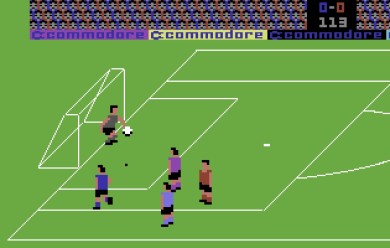
International Soccer
You probably haven't heard about this gem from 1983 and I honestly don't really remember it that well myself but International Soccer was the very first game I ever played on the first computer I owned, a Commodore 64. I received the C64 as a christmas present if I remember correctly but awfully have no idea in which year. International Soccer came along with it on a cartridge. Playing International Soccer was more or less the kick that got me interested in games and computers in general so it probably paved the way for everything I'm doing today. Strange thought.
Looking around for the game on the web I found a gameplay video on YouTube. Go check that one out, it was really intense and recent versions of Pro Evolution Soccer or FIFA are simply no match!
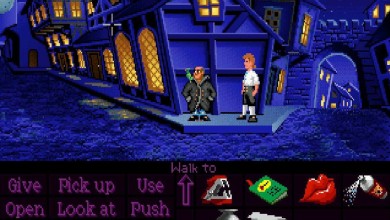
The Secret of Monkey Island
"My name's Guybrush Threepwood, and I want to be a pirate!" - This line was the start to the most clever and fun thing I ever played. And by ever I mean that there isn't much that comes close even today. The Secret of Monkey Island has the perfect mix of a great story, tricky puzzles and humor - some of which I probably didn't even get back in the day. Be it the copy protection "Dial-a-Pirate", classic quotes like "Look behind you, a three headed monkey!", the fighting mechanic using insults and comebacks or the infamous "Insert Disk 22" joke, many things got me laughing and wanting to play on and on. For me it really kicked off the adventure game genre although Maniac Mansion and Indiana Jones and The Last Crusade did a pretty good job a few years earlier as well.
I also loved the remake The Secret of Monkey Island: Special Edition which was a great makeover regarding sound and art. The best feature was the ability to switch between Special Edition and Classic Mode seamlessly at all times, though.
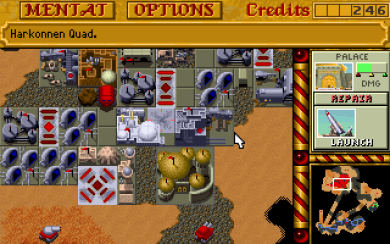
Dune II
Walking through the genres and having sports and adventures already covered it's time for some real-time strategy and the genre defining title in this area: Dune II. I have to admit that I'm a hopeless Dune fanboy having read the books back and forth in multiple editions and languages which might cloud my judgement but this game was a revelation to me.
I recently fired up Dune II in an emulator again and that was one of the times where I realized that game design made a big step forward and that memories are often euphemistic. The genre evolved a lot since the release of Dune II in 1992 and compared to todays standards - and games like the Command & Conquer series or Warcraft III leading there - Dune II plays really bad. But that's ok, I loved the game and a lot of real-time strategy titles that came afterwards.
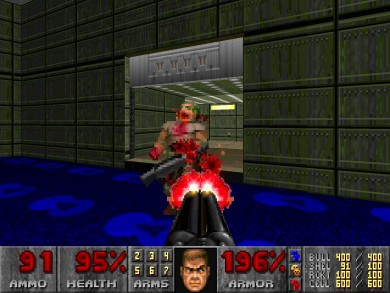
Doom / Quake
These two games go hand in hand for me and I couldn't decide which was more influential. Both of them beat everything I mentioned before easily and both of them accompanied me through the years and continue to do so today.
Let's start with Doom, a game so intense that it literally kept me at the edge of my seat. Wolfenstein 3D was fun and all but starting up Doom and hearing the sound of the first door I opened got me hooked instantly and I couldn't let go. After spending countless hours playing the single player missions and even more hours deathmatching good friends on the first LAN parties in airless basements (after hours of troubleshooting the BNC network that is) I discovered that Doom is modable and you can create your own maps: I was in paradise. Right now I'm looking forward to the new Doom.
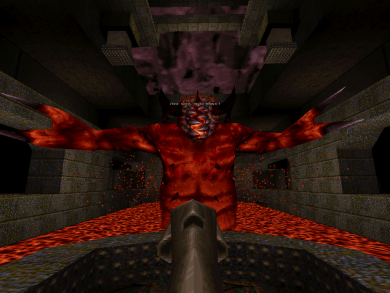
Just three years after the release of Doom, in 1996, another game rocked my world and managed to make me put even Doom to the side: Quake. I was an okish player and had my share of fun at LAN parties (especially playing TeamFortress in a clan) but the thing I got the most out of was the mapping I started with Doom. There was nothing I loved more than starting up the Quake soundtrack by NIN, cranking up the volume and getting carried away mapping my own mulitplayer arenas. You can find many of the results of my mapping endevours over on the Maps page.
I keep firing up these two gems from time to time and even haven't given up on mapping completely. I don’t have the time to really finish a map these days but sometimes, when the urge takes over, I place a wall or two and a rocket launcher in between...
Honorable Mentions
Writing these lines a couple of other games came to mind. I don't want to write anything about them as they didn't influence me as much as the ones above but still mention four of them which really deserve it in my humble opinion due to consuming way to much of my time: Tetris, Dynatech, Master of Orion and Warlords.
Coming to a close I realize that there is not a single role-playing game on my list. This is strange on the one hand as I really like the genre but I guess rather plausible on the other hand as no computer RPG is able to top the pen and paper experience of which I had my share.
